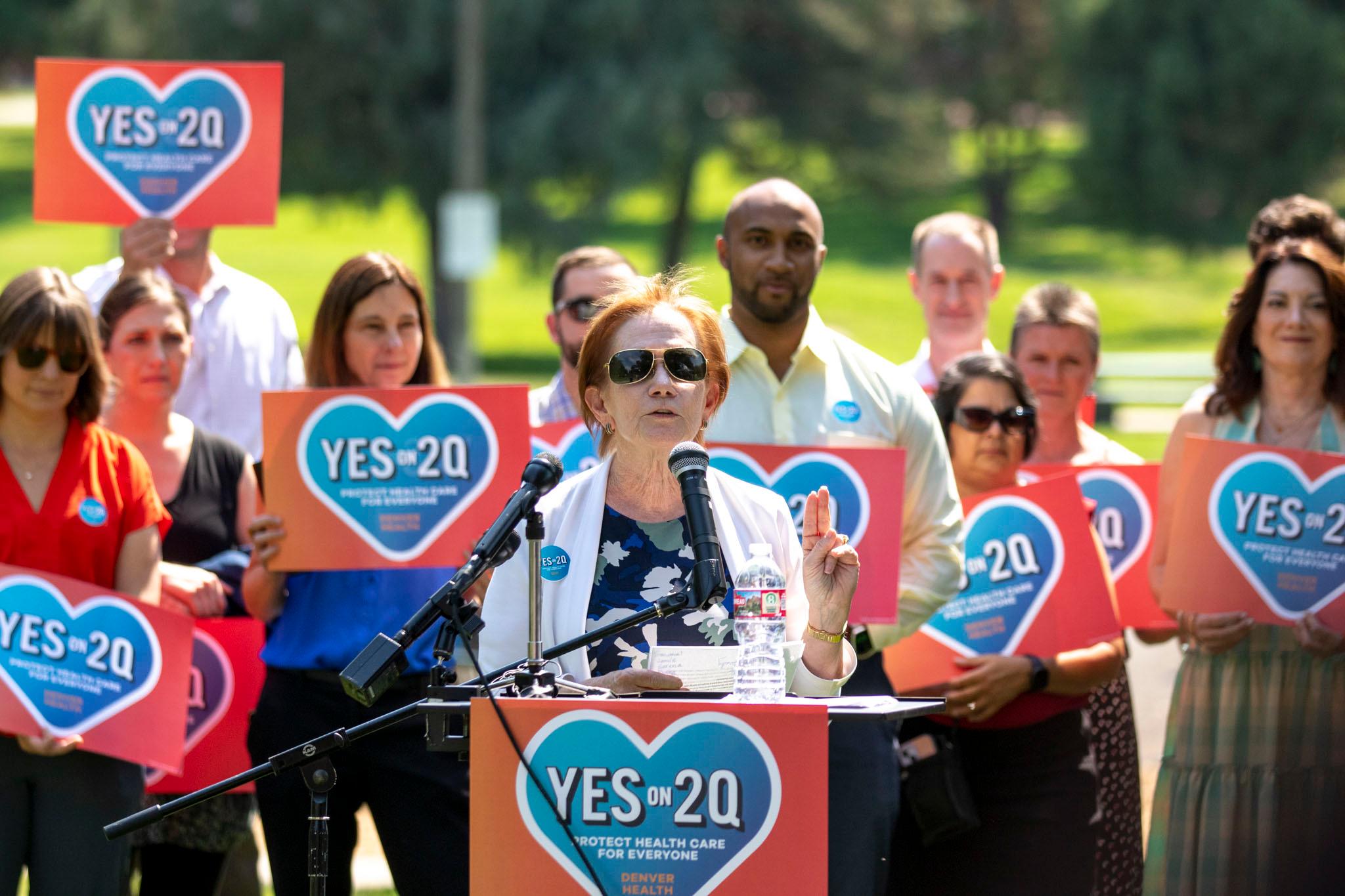A group supporting a ballot measure to assist Denver Health kicked off an election-season campaign on Tuesday to encourage city voters to support a sales tax to help solve a dire funding crisis.
The effort on behalf of the city’s public hospital, called Healing Denver, brought out the big guns — the current mayor and perhaps his best-known predecessor — as it launched the campaign.
Mayor Mike Johnston joined a crowd of a few dozen in a park across the street from the hospital’s main campus near Bannock Street and Speer Boulevard.
Johnston recalled his first day in office when two police officers were shot in the line of duty.
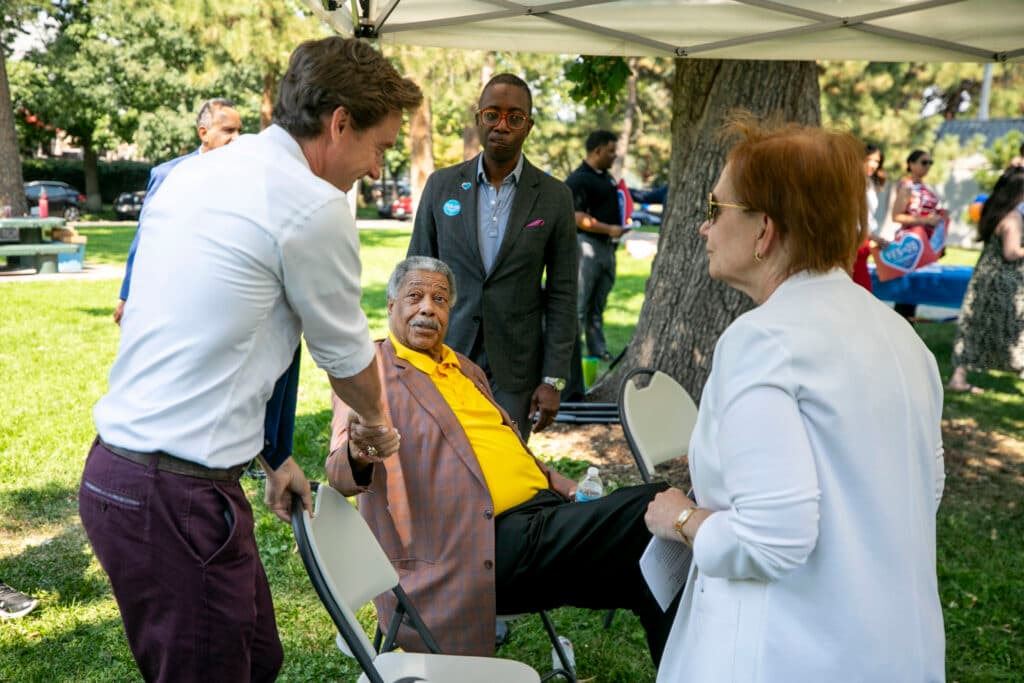
Hospital staff “made sure those officers who literally risked their lives for the city and county of Denver were going to have world-class treatment right here in the city to make sure they thrived and survived, which they did,” the mayor said.
“In that moment, Denver Health is there,” continued Johnston, who called for voters to be there for the health system by voting on Ballot Issue 2Q.
City residents will vote Nov. 5 on a .34 percent sales tax, which works out to 3.4 cents on a $10 purchase. It would raise about $70 million annually, according to Denver Health CEO Donna Lynne. It would have to gather support from at least 50 percent of Denver voters to pass.
“We need Denver Health. If you don't have your health, you don't have anything,” said former Mayor Wellington Webb, who was instrumental in the creation of the modern Denver Health, “a state-chartered institution with a public mission.”
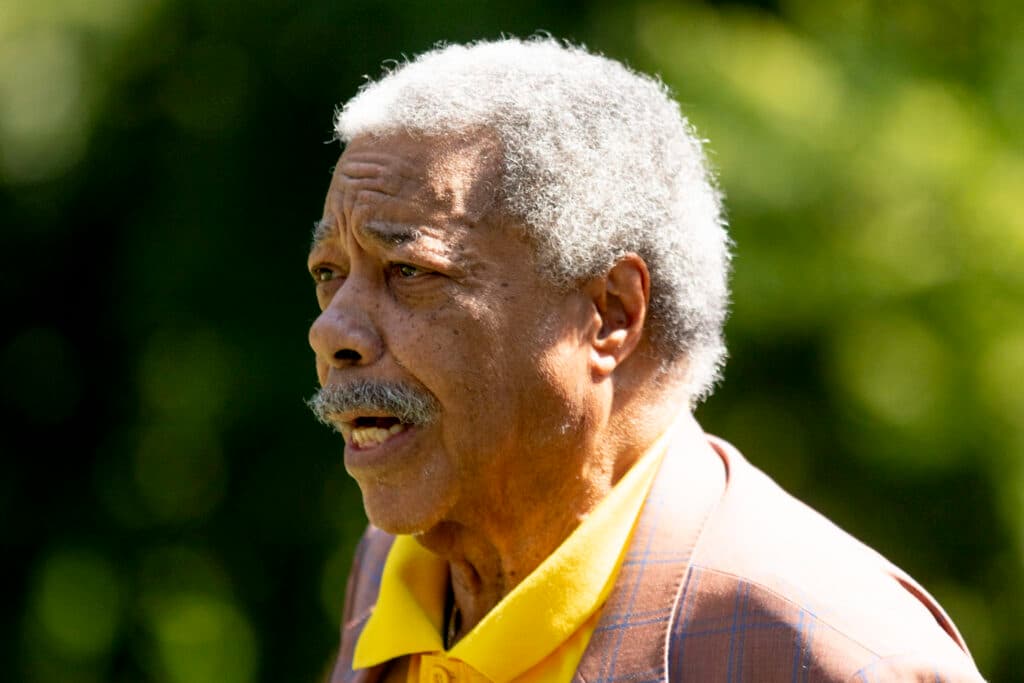
“Are you willing to stand up for Denver Health? Are you willing to fight for it and nurture it and protect it?” Webb said, calling out to the crowd, which included a large and diverse group standing behind him with Yes on 2Q signs.
So far, the campaign to pass the sales tax has reported raising about $800,000. Lynne is the top reported contributor to date, giving $60,000, according to the Denver campaign finance dashboard.
Denver Health, a 'safety net' hospital, faces some dire financial straits
Denver Health, once known as Denver General, was founded in 1860, before even the city or the state were incorporated. It serves nearly 300,000 people each year and is considered the “safety net” hospital.
Lynne, a former lieutenant governor of Colorado, laid out a stark financial reality.
“Health care costs are going up and they're going up substantially year after year after year,” Lynne told the crowd. “Since just 2019, we have seen two and a half times more uncompensated care at Denver Health, people who are uninsured, people who are underinsured, and who desperately need our care.”
Denver Health's overall patient count has doubled in the last 20 years, according to the hospital system.
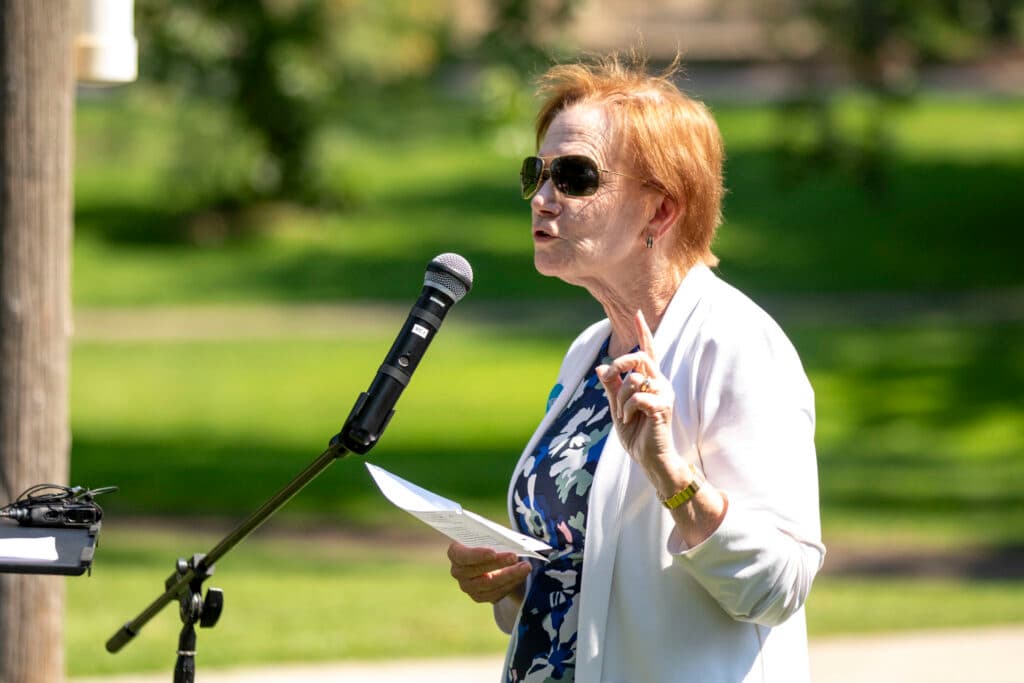
She said if the measure fails, services will be cut.
“Primary care, emergency services, mental health services, pediatric care and substance use care are honestly at risk if we don't pass this measure,” Lynne said.
The money raised will help the system, which has rapidly seen expenses outrun revenue, cope with annual costs for uncompensated care which rose to $140 million in 2023.
The arrival of tens of thousands of new immigrants contributed to those costs, with about $10.5 million of the sum going to treat an estimated 8,500 newly arrived people.
“It is less than 10 percent of the increased uncompensated care that we've seen over the last several years,” Lynne said, noting the system has a responsibility to care for everyone regardless of their ability to pay and also is looking out for the health of the entire community.
One Denver council member worried it would be one of many new sales taxes
The ballot measure has no organized opposition, Lynne told CPR, noting that the system has been cutting costs as the situation has worsened.
When the city council weighed placing the measure on the fall ballot in June, only one person voted no, Councilmember Kevin Flynn. He expressed concerns about the city getting too reliant on sales taxes to fund city services.
“I do feel like someone needs to be the canary in the coal mine, and I guess that's going to be me,” Flynn said.
He said he wanted governments outside of the city, whose residents also seek care in Denver, to help pay for hospital services.
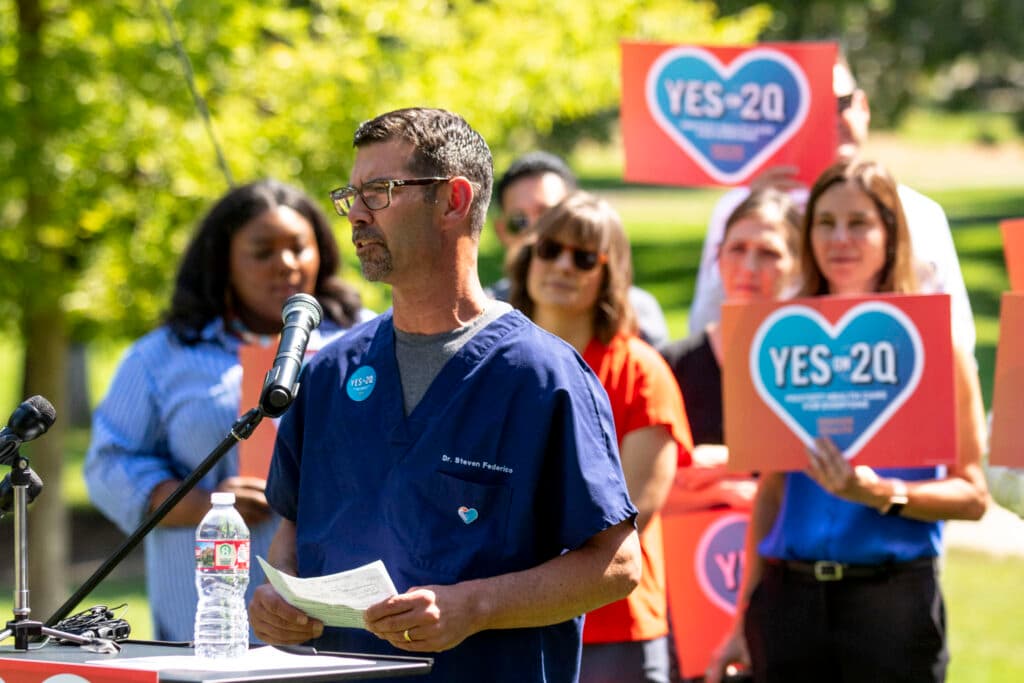
Lynne said she and earlier CEOs have tried to make that appeal. One even sent letters with specific tallies of how much Denver Health had spent on care for residents of other cities. But, no dice.
“We didn't get any answers back. Certainly we didn't get checks,” she said.
Health care costs are going up even as city contributions to Denver Health remain the same
Lynne noted the state legislature and governor have given Denver Health about $11 million over the last two years to help pay, at least a bit, for the uncompensated care.
Other safety net hospitals around the country can count on much more public financial support, Lynne told the crowd.
“This measure is designed to address concerns about affordability, ensuring that the impact on families is pretty minimal,” she said. “I want to assure you that it will be directed to the core services that the voters care about.”
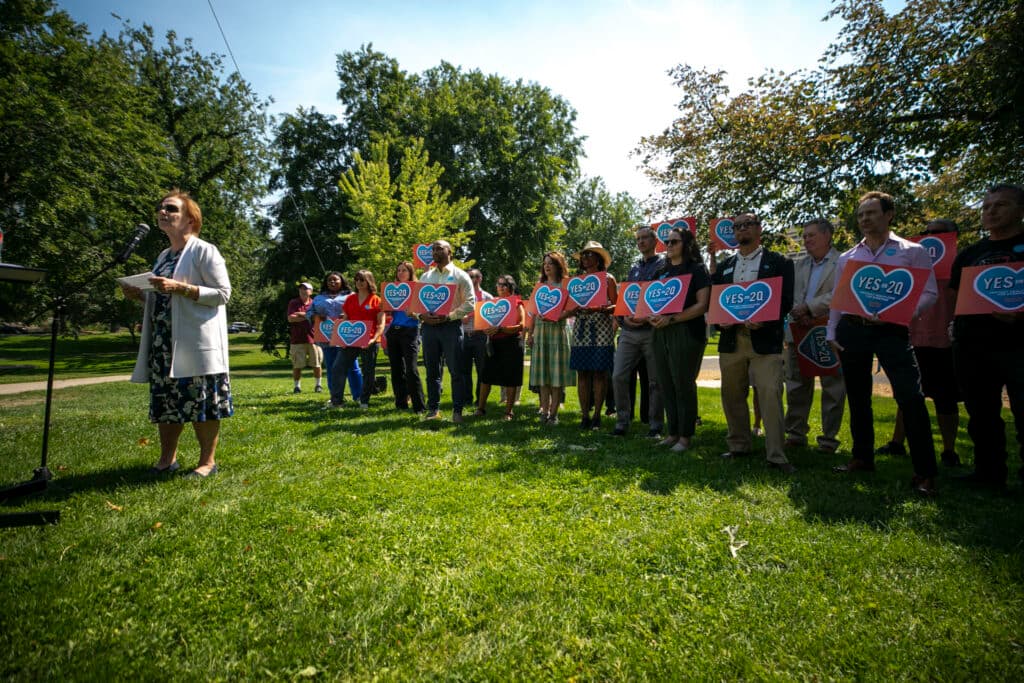
Denver Health is funded from a variety of sources: private insurance, public programs like Medicare and Medicaid, and money from the city and state.
The cost of health care, especially for patients without insurance, has gone through the roof. However, the City of Denver’s contribution to Denver Health’s budget has remained essentially flat, Lynne said.
Other city leaders called Denver Health 'a pillar in this community'
Other speakers at the event underscored Denver Health’s central role in the health of the city.
“It is a pillar in this community and they provide essential care to all Denver residents, especially those who are underserved, are underserved populations, are underinsured populations, and anybody who is in need,” said Councilmember Jamie Torres, who represents District 3 and co-sponsored the measure in the council. “This is not an institution that we want to fail.”
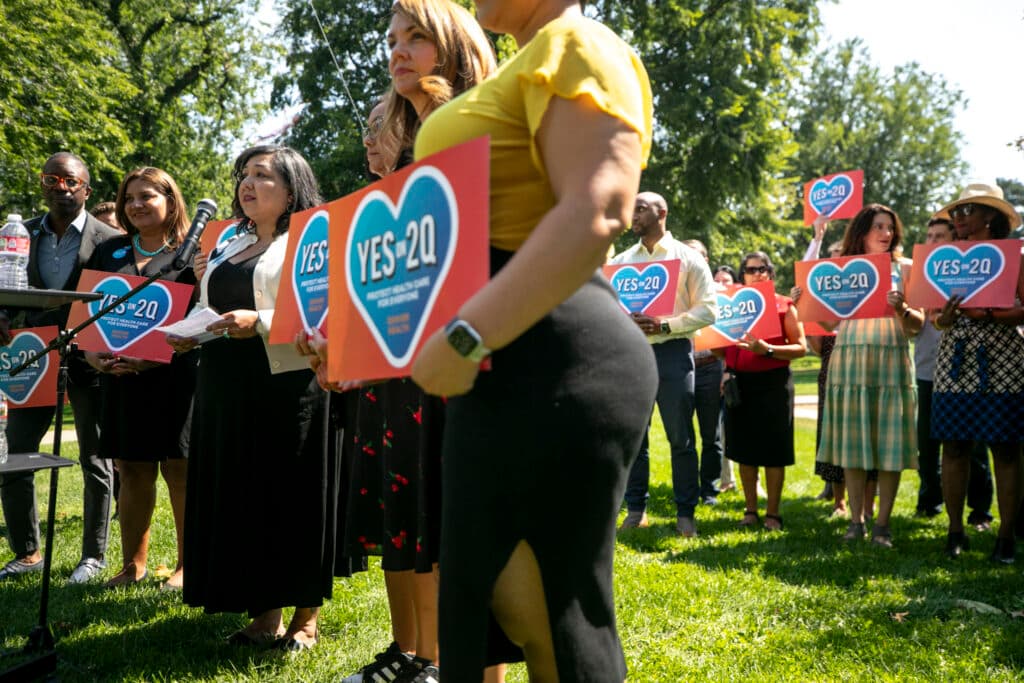
Serena Gonzales-Gutierrez, an at-large city council member, also a co-sponsor, said Denver Health is where the community’s most vulnerable populations receive health care.
Webb, in a campaign-style rallying cry, urged supporters to fight to convince their neighbors to back the ballot measure.
“I ask all of you as you knock on doors, don't take anything for granted. Knock on every door and ask every person,” he said.
Editor's note: This article was updated to correct a misstatement by Donna Lynne. She said that Denver Health's overall patient count had doubled in two years, but it was actually closer to 20 years, according to a hospital spokesperson.

